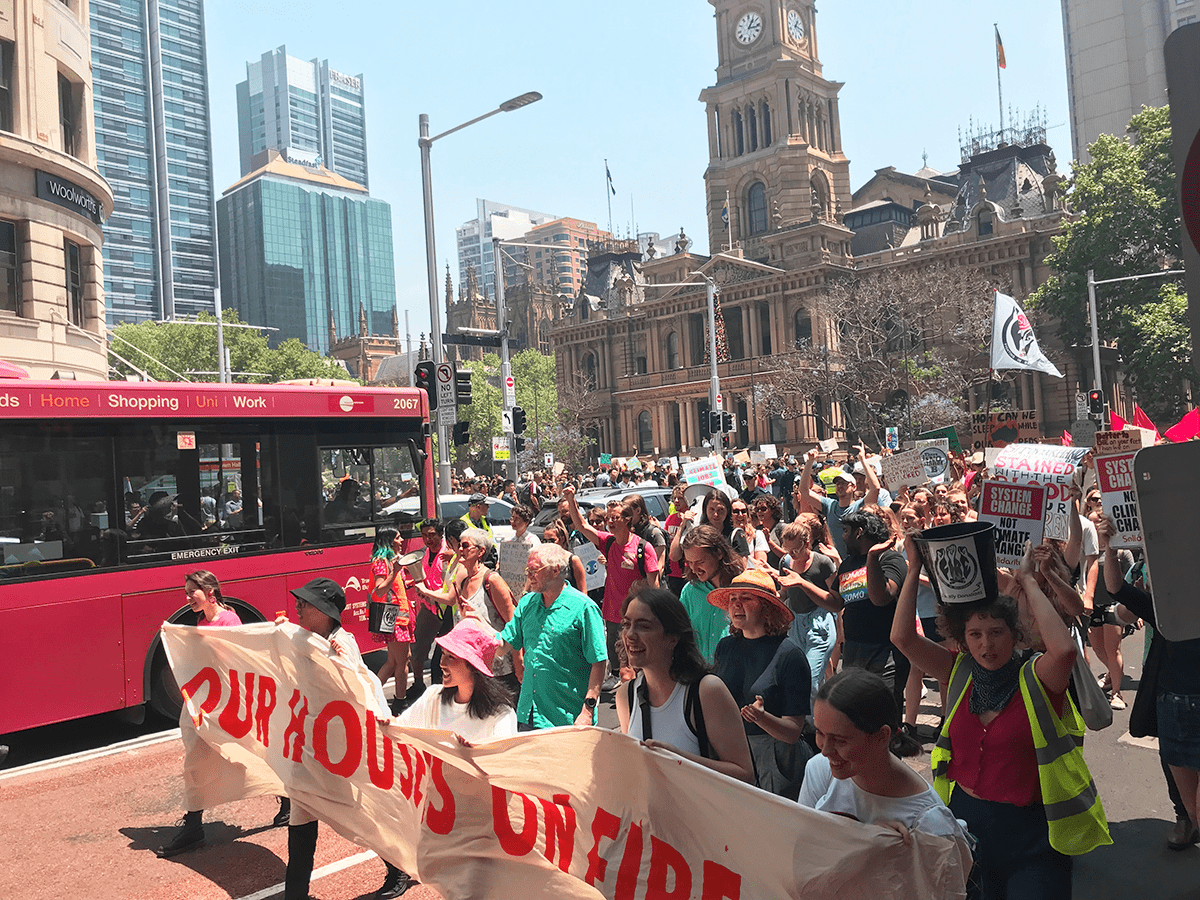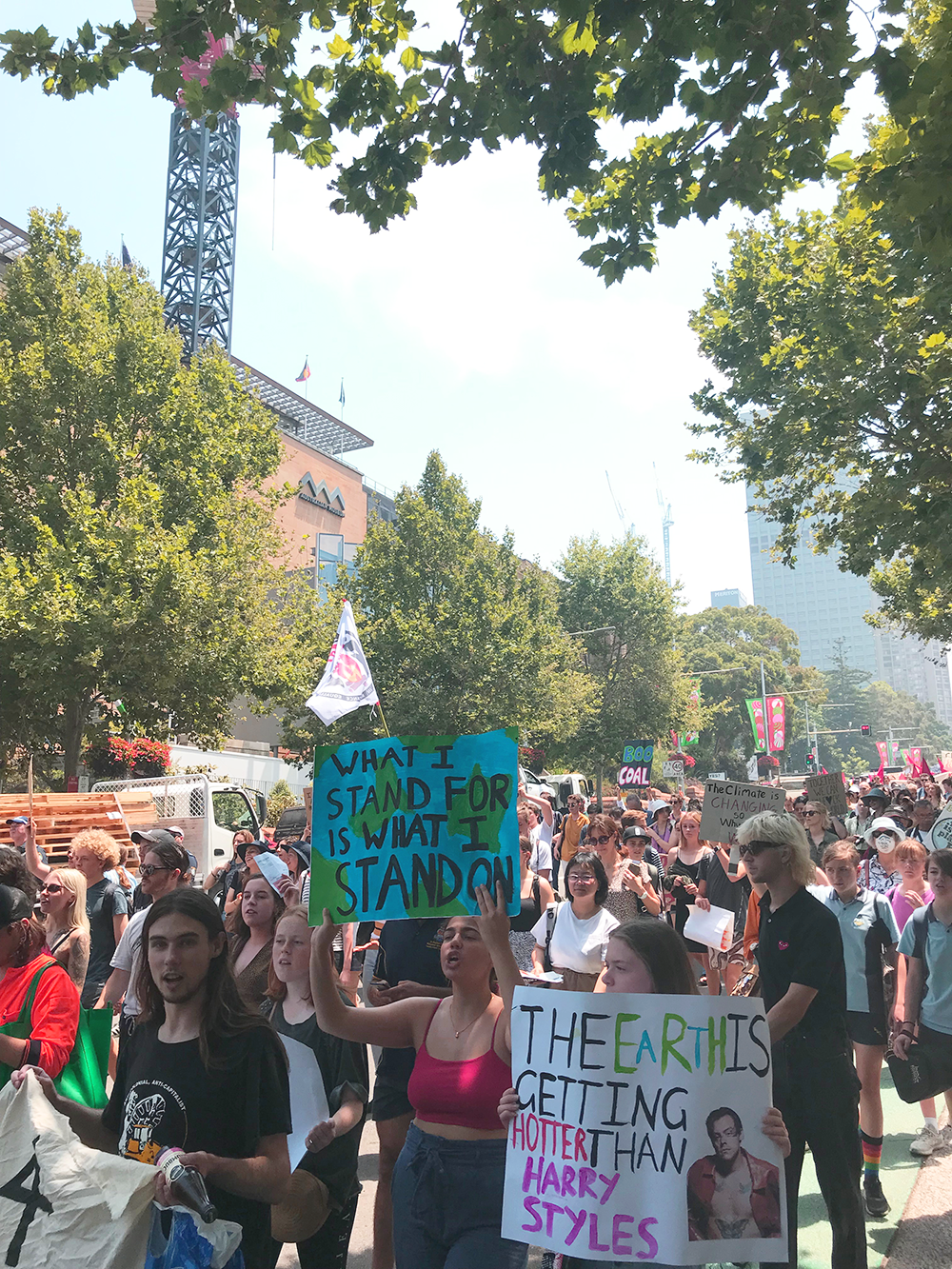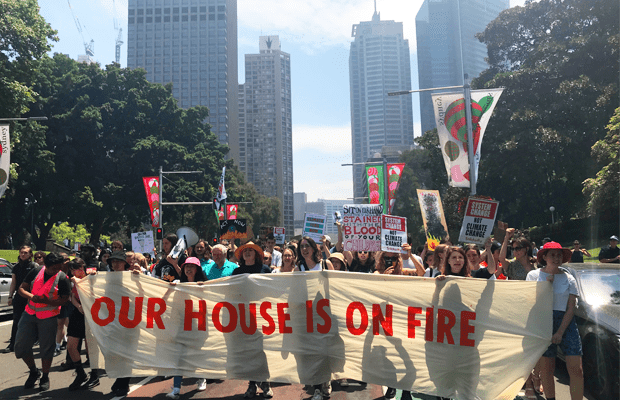Rounding out what is being described as the year of the climate strike, 1000-odd high-school and university students and community activists joined in Sydney’s CBD for the Global Day for Climate Justice.
Although lower in size than previous climate rallies, it was clear that the politics of the event were well-consolidated following a year of organising around the issue — the event was highly energetic, despite coinciding with university exams.
The need for prioritising First Nations’ justice amongst climate organising was at the forefront of all conversations throughout the day. Every speaker, starting from co-organiser of the rally Dashie Prasad, stressed that all activism should consider how climate change has always and will continue to disproportionately affect First Nations communities.
The rally promoted four key demands. First, for global Indigenous justice (a principle that was strongly promoted by all speakers, particularly in regards to the need for land and water sovereignty); secondly, for no new sources of coal, gas, oil, or uranium to be built, including the Adani coal mine in Queensland; thirdly, a guarantee of 100 per cent publicly-owned renewable energy by 2030; and finally, proper government infrastructure for a just transition to renewable energy, and a job guarantee for climate jobs with the right to strike protected.
Several recent climate change events served as focal points for the rally — in each case, the nature of government culpability was emphasised. First and foremost, speakers invoked emotions surrounding the past month of horrific bushfires across NSW and Queensland, which have destroyed 500 homes and 1 650 000 hectares of land. The Coalition government’s inaction on climate change was bemoaned by many, including the cutting of funding to NSW’s volunteer fire services.
Muruwari and Budjiti man and artist Bruce Shillingsworth spoke at length to the water-crisis along NSW’s Murray-Darling Basin, of which 40 per cent of the people living along it are First Nations people. Over the past year, the Federal Government has failed to alleviate drought conditions exacerbated by a system of water-licenses for agricultural companies, leaving local communities reliant upon community activists for access to clean water.

“What river?” Shilligsworth asked. “It is now completely destroyed because of corporate greed, selling our waters to make a profit. How long people have said that water is to be shared… not to be owned by anyone.”
“We have got to stand up to the greed, the corruption, to capitalism.”
Throughout the event, buckets were passed around to raise money for Fighting In Resistance Equally (FIRE), who will be continuing to run water up to the Murray-Darling Basin over the summer.
Rebecca Gilson, of the UNSW branch of the National Tertiary Education Union, spoke to the need for climate activism to also promote strong class consciousness.

Lily Campbell, the National Union of Students LGBTI Officer and member of Extinction Rebellion, reminded attendees of the need to protect our right to protest, after widespread instances of police brutality outside the International Mining and Resources Conference this year, including the breaking of legs of a climate protester. Campbell herself was held in police custody for 27 hours after being removed from a sit-in at an Extinction Rebellion rally in October.
“Politicians… like to proclaim that in a liberal, pluralistic society like Australia, that we have the right to protest and the right to freedom of speech,” Campbell remarked. “But what they really mean is that they’ll accept protests that are easy to ignore… and that any protest that dares to disrupt the status quo will be deemed criminal, and they will say that the participants of that protest will be outlawed.”

The rally was organised by four groups, predominantly made up of university-student and community activists: Uni Students for Climate Justice, Australian Student Environment Network (ASEN), Spreading the Climate Strike, and the Sydney Uni Environment Collective.
Following speeches, the rally then proceeded to march from Sydney Town Hall, past Hyde Park, and along Williams Street. There was a reliably heavy-handed and overbearing police presence throughout the march, which flared at moments where the rally stopped to stage a ‘sit-ins’ — where all marchers sit on the road to block traffic, and listen to more speeches.
After hurrying along the first sit-in next to Hyde Park, and then unsuccessfully attempting to veer the march onto the footpath, police presence escalated particularly as the march approached Kings Cross — several police horses were called to intimidate marchers off the road, and several officers attempted to physically push individuals off the road, despite the march having sought formal permission to occupy the road until 2pm.
2020 State Convenor of ASEN and co-organiser of today’s march, Seth Dias, described the event as “really great” despite police behaviour, celebrating that “We got just above the expected numbers and had great speakers who reflected our vision and called for climate justice.”
“The march was largely positive until cops became heavy handed and obsessed with moving the rally on. Many members in the rally decided to sit in at one point and the police responded by threatening to get very violent if people didn’t move on. Luckily no serious incident occurred.”
Dias stressed that this occurred even despite having official approval to to occupy the road outside Liberal party headquarters on Williams Street.
As the event closed, significant energy appeared primed for the coming year, hopefully to affect Australia’s policy regarding both climate change and how it engages with First Nations people.
Photography by Liam Thorne.





